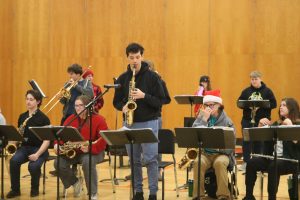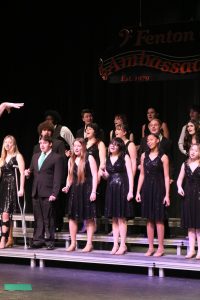Students voice their opinions to school board members
April 27, 2015
Because of the need to reduce the budget, the school board has decided on three possible items in the school to cut: IB, block scheduling, and SRT. Junior representative Mckenzie Mead scheduled a meeting in the lecture room on Apr 24 to allow the board members to hear student opinions concerning these items in order to help give them a greater idea of what the community feels should and should not be cut.
“We’re basically trying to talk about the ideas of IB, and SRT, and block scheduling, and what they mean to all of the students and how important they feel they are.” Mead said. “We want to hear the truth, and want to hear what everyone has to say.”
Before the meeting started, Treasurer of the school board Tamara Valley spoke up to thank everyone for coming and to voice her concern over the public’s opinion of what the board does for the schools.
“It is so important to us to make sure that the decisions we make as a school board are the right ones for our students and are community,” Valley said. “ We think it’s important to make sure that what we’re doing is impacting you [the students] in the most positive way.”
The first topic covered was block scheduling. The comments about block scheduling included one from a senior who focused on how block scheduling impacts her understanding of the material, teachers, and homework.
“With block scheduling it prepares you more for college, you’re not going to have each class every single day,” senior Katrina Huotari said. “If we were to go back to where we had six to seven classes each day it wouldn’t give you as much time to cover as much material as it would with 90 minutes. It gives you time to go over and actually understand everything, and it gives you an extra night, plus an SRT to do homework.”
The second topic brought forward was SRT. School of choice students who did not have SRT before coming to Fenton talked about how they liked having an hour to do their homework and see teachers rather than the alternative. A member of the photography staff also commented on the benefits the newspaper and yearbook staffs were given from having SRT.
“I am coming from a newspaper and yearbook point of view,” junior Hope Dagenais said. “I’m a photographer, I honestly don’t know how the staffs would deal with all of the work we put into the newspaper and the yearbook without SRT. We use it so much to take photos and do interviews for the writers. We spend so much time out of school doing this work as well, but we would have to spend all that more time that we use SRT for.”
The last point covered was IB. Senior Neelesh Peddireddy pointed out how, unlike IB, Advanced Placement (AP) classes were more memorization and focused more on the content that was being taught. One sophomore expressed his view on the AP classes the school offered, and the price difference between each of the programs.
“This year I took an AP class, and it has benefited my communication, teamwork, and public speaking skills,” sophomore Madeline Welch said. “I look at what people are benefiting from IB and it’s almost the same thing, like you’re earning college credits, you’re taking a harder class, but AP costs less. Not only for you guys [the school board members], but for us too because the IB cost to just take the class and the test is more and for AP you only have to pay to take the test. I am by no means bashing IB, I just don’t see the logic behind keeping it if we cannot afford it.”
Senior Lydia Wandmacher commented on how IB classes taught her more than just the information, and how it instead taught her other things that she could use later in life.
“I did the Diploma Program,” Wandmacher said. “I’ve taken some AP classes too. I feel like AP is more about memorization,and facts whereas IB has taught me skills. Like in the English class, I can read a book and actually understand not just the story but all the details and analyze it. I’ve learned more skills in IB. I didn’t take the classes for college credit, I took them to learn, not just memorize things.”
In the end, the members got to hear what the school is saying about each of these topics. Now they are able to consider the community’s views on the possible budget cuts when it comes time to make decisions.







